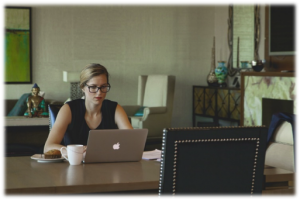
“I find that I become one of two moms when my children are upset. I’m either Mary Poppins — kind, loving, patient — or I’m completely intolerant and prone to yelling and screaming.”
–Concerned Mom
If you’re yelling at your kids, you’re not alone. Yelling seems to have become something of a parenting epidemic. Some are even calling it “the new spanking”. Why are so many dedicated, intelligent, aware parents losing control?
My sense is that parents often end up yelling because they’ve actually made the very positive decision to give their children boundaries with respect rather than punishments and manipulation. These parents are working really hard to remain gentle and kind, and yet their children’s testing behaviors continue. They become increasingly frustrated, even fearful, feeling they’ve lost all control without any way to rein their children in.
And it’s no wonder! If I attempted to absorb all the vague, contradictory advice I’ve seen and heard regarding discipline, I’d be blowing a gasket on a regular basis myself. So many of these theoretical ideas are seductively warm and fuzzy, but they come with a whole lot of scary don’ts (“don’t punish, reward, control, give time-outs or consequences, use the word ‘no’, expect obedience, be authoritative, etc”), and very little in the way of practical tools.
If you’ve been yelling, here are some thoughts to consider:
1. You aren’t taking care of yourself
A long soak in a warm tub, getting away with friends or your spouse are always good ideas, but what I’d suggest is far more basic and crucial: know your limits and personal needs, and establish boundaries with your child from the beginning. Yes, even with your infant.
For example, in the context of a respectful relationship (which means perceiving your infant as a whole person and communicating with her as such), it is okay for your baby to cry for a few minutes while you make your regular morning trip to the bathroom to brush your teeth. You leave your baby in a safe, enclosed place, tell her you will go and always acknowledge her feelings when you return.
Since you are respecting your baby’s need for predictability, you’ve made this activity a habitual part of your day together, and your baby learns to anticipate that you will go and return. She still may complain, which is her right, but you confidently let her know you hear her and accept her expression of displeasure. “You didn’t want me to go. That upset you. I’m back.”
If you are a sensitive person who can’t sleep deeply with your baby near you, but you’re co-sleeping because you think you should, you are not taking care of yourself.
If you want to wean your child or limit your toddler’s nursing, but you feel guilty about that, you are not taking care of yourself.
If you need to go to the kitchen to make a cup of coffee, but you’re afraid to leave your fussy baby or screeching toddler, you are not taking care of yourself.
In fact, if you feel guilty about any self-care moment, you are probably not taking care of yourself.
We all give up much of our lives for our children, but it is unhealthy for us (and even less healthy for our kids) to become an egoless parent, neglecting our needs and virtually erasing ourselves from the relationship. We need personal boundaries, and our children need us to model them. This is what it means to have an honest, authentic, respectful relationship that will make limit-setting in the toddler through teenage years clear and simple (notice I didn’t say “easy” — because it’s hardly ever easy).
Parenting fact: Our babies and toddlers will never give us permission to take care of our needs. “Go ahead and take a little break, mom, you deserve it!” will never be said or implied through our young children’s behavior, even on Mother’s Day. Quite the opposite, in fact. These boundaries must come from us, and our children will do their job by objecting, rebelling, making demands and more demands, and continuing to feel around for our limits until they are firmly and consistently in place.
2. You have spent your baby’s first year distracting, appeasing or otherwise manipulating her rather than speaking honestly about limits.
It disappoints me to hear some of the non-punitive discipline advocates I admire making statements like this one: “The bad news is that babies often want everything they see. The good news is that they’re generally distractible during the first year.”
Your baby is a whole person ready to engage actively and honestly in a relationship with you at birth. When you distract, you are practicing avoidance – denying an honest connection in order to side-step your child’s healthy feelings of resistance. The pattern this creates for both of you will make it so much harder for you to feel comfortable setting respectful limits later on. This formative first year is a crucial time to set limits honestly, because this is when we will establish what will always be the core of our parent/child relationship. (For more about setting limits honestly with babies, please read 5 Reasons We Should Stop Distracting Toddlers (And What To Do Instead)
3. You feel responsible for your children’s emotions
Here are the main reasons parents neglect to establish personal boundaries with their children or use manipulative tools like distraction (all of which often lead to yelling):
- They don’t believe a baby is really a whole person who can understand words and interact honestly.
- They can’t make peace with the discomfort they feel surrounding their child’s emotions.
- They perceive all crying as something to avoid or fix, “one-note communication”, rather than a nuanced dialogue.
- They ride the whirlwind of their child’s disappointment, sadness, anger, etc., rather than being an anchor with the understanding that it is essential to emotional health for children to express themselves.
This unhealthy perception of children and their feelings thwarts the development of emotional resiliency, creates the need for even more limit-setting in the toddler years, and will exhaust you every time you have to say ‘no’ or insist upon something (which will be often). The toddler years, especially, are a limit-pushing, resistant period. Your child needs to behave this way in order to individuate in a healthy manner. If you feel pained about or responsible for your child’s daily roller-coaster of emotions, you’re going to be reluctant to set honest limits, get tired, and probably end up yelling…or crying, which isn’t healthy for your children either.
Repeat after me: Once I’ve fulfilled my child’s basic needs, my only responsibility regarding feelings is to accept and acknowledge them.
4. Your expectations are unreasonable
You also might be yelling because you are expecting the impossible. Children are explorers. They need safe places where they can freely move, experiment, investigate. Asking a toddler not to run, jump or climb is akin to saying, “Don’t breathe.” Create and find safe places for your children to play. Don’t expose them to materials or equipment they can’t use as they wish and thereby set yourself up for frustration and anger when they don’t comply.
It’s up to us to avoid situations that will try our patience rather than get caught up struggling to keep the peace and make it work.
5. You are confused about setting limits gently with respect
Join the club, and please allow me to introduce you to the most well-tread section of my blog: (HERE) And my book: No Bad Kids. I also recommend the blogs Regarding Baby, Not Just Cute, Abundant Life Children, Mama Eve, Aunt Annie’s Childcare, Core Parenting and Teacher Tom for their wealth of helpful advice and advocacy for respectful limit-setting.
6. You needlessly enter into power struggles
It takes two to struggle, so don’t engage. You are not your child’s peer; you are her capable leader. So, instead of taking your child’s healthy, age-appropriate button-pushing behavior personally and going to that “uh-oh” place that leads you to yelling:
a) Make eye contact with your child and confidently state a limit: “It’s time to brush your teeth.”
b) Give a simple choice or opportunity for an autonomous decision: “If you can come now, we’ll have time for a second book.”
c) Acknowledge your child’s feelings of disagreement (and welcome those feelings to continue as long as they need to, while you continue to acknowledge them). “Oh, I know you are having so much fun with the dog and it’s hard to stop, but it’s time. What a bummer! You are really upset and disappointed that it’s bedtime. I know the feeling.”
As completely counterintuitive as this is for most of us, it works. The more you are willing to agree with your child’s feelings while calmly holding on to the boundary, the easier it will be for her to release her resistance and move on. How can your child continue to fight when you won’t stop agreeing with her? This parenting “white-flag” of empathy will miraculously dissolve the tension for both of you.
d) If your child still does not comply for whatever reason, follow through by taking her hand (literally or figuratively). “You’re having a hard time coming upstairs to brush your teeth, so I’m going to help you.” You calmly take her hand, and then perhaps you add, “Thank you for letting me know you needed help.”
This by the way, is exactly what she was doing. And once you’ve recognized that all of your child’s resistant, impulsive, objectionable behavior is really just an awkward request for your help, you’ll probably find it easier to stop yelling about it.
By Janet Lansbury






